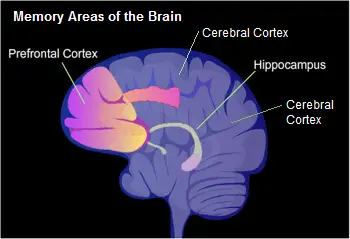- Home
- Better Memory
- How Memory Works
How Memory Works - A Quick Guide
Let's take a quick look at how memory works. Understanding these basic concepts will be helpful as you take steps to improve your memory using the tips and techniques I explain on this website.
And don't worry, I'm going to keep this really simple. There are plenty of science websites around the web that go deep into how the brain works. That's not my purpose here.
I'm just going to hit a few highlights, and outline just what you need to know to have a basic understanding of memory.
First of all, memory, thinking, and learning occur in the brain, as you know. And these processes are connected.
"Learning" means to absorb new information as knowledge. "Memory" means to store and later recall (remember) what you've learned. "Thinking" means using reason to combine information from your senses plus knowledge from memory, as when solving problems.
See how memory works together with thinking and learning? The three processes support each other.

Recall from Memory
As for memory itself, the process of creating a memory and using it is this:
1. Sensory Input. Through sight and hearing, and other senses, information enters your brain.
2. Learning. Your brain interprets the information so that you understand it, and incorporates it into your base of knowledge.
3. Memory. The new knowledge is stored in memory for later use. This knowledge is consolidated into permanent memories during sleep.
4. Thinking. Information is recalled from memory, as needed. In the working memory space, this is combined with information from short-term memory and the senses (see below).
Now let's zoom in and quickly consider three types of memory that are important to know about for memory improvement purposes.
Three Types of Memory You Should Know About
Your brain is amazingly complex. According to experts, the brain is the most complicated object in the universe.

Memory Areas of the Brain
Don't let that scare you. For the purposes of improving your memory, you only need to understand the basics of how memory works as outlined here.
Long-term memory is what most people consider their actual "memory". That's the type of memory you use to remember what happened on your 12th birthday or to recall that the capital of Canada is Ottawa.
But there are actually two other kinds of memory that are very important as well. They are "short-term memory" and "working memory".
Here's what each type of memory does:
Short-term memory. This is temporary memory. It lasts for only a few seconds if you don't rehearse (repeat) the information.
For example, when you hold a phone number in memory just long enough to dial it, you're using short-term memory. Short-term memory is located in the hippocampus, a seahorse-shaped structure in the temporal lobe of the brain, as well as in a lesser-known brain structure called the subiculum.
Working memory. This is your mental workspace, where thinking and problem solving occur. Working memory is where you pull together knowledge from memory storage (long-term memory) and combine it with input from your senses and information in short-term memory.
Working memory is limited. According to recent studies, the average person can hold only hold 3 to 5 chunks of information in working memory at one time. Working memory is located in the prefrontal cortex of the brain.
Long-term memory. This is your primary memory storage. These memories include general factual knowledge, how-to procedures, and memory of experiences and events.
Long-term memory is located in the outer layer of the brain, the cerebral cortex. These memories can last indefinitely. The reason you don't remember everything is usually failure of retrieval.
So there you have it. A quick overview of memory, including its structures and processes. That wasn't so bad, was it?
There's obviously a lot more to how the brain functions and how memory works. But now you've got a simple framework to refer to as you explore this website and work to improve your memory.
[+] References for How Memory Works
Published: 03/16/2017
Last Updated: 06/11/2020

Newest / Popular
Multiplayer
Board Games
Card & Tile
Concentration
Math / Memory
Puzzles A-M
Puzzles N-Z
Time Mgmt
Word Games
- Retro Flash -
Also:
Bubble Pop
• Solitaire
• Tetris
Checkers
• Mahjong Tiles
•Typing
No sign-up or log-in needed. Just go to a game page and start playing! ![]()
Free Printable Puzzles:
Sudoku • Crosswords • Word Search







